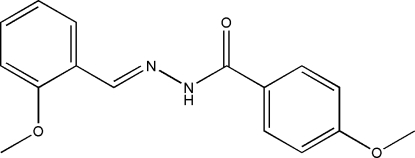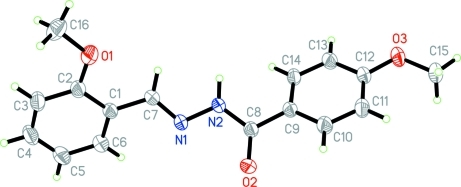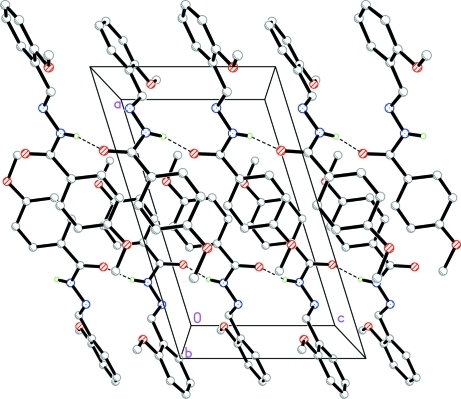Abstract
In the title compound, C16H16N2O3, the two benzene rings are inclined to one another by 75.4 (2)°, and the molecule adopts an E configuration about the C=N bond. In the crystal structure, symmetry-related molecules are linked via intermolecular N—H⋯O hydrogen bonds, forming chains running parallel to the c axis.
Related literature
For related structures, see: Alhadi et al. (2008 ▶), Küçükgüzel et al. (2003 ▶); Mohd Lair et al. (2009a
▶,b
▶); Li et al. (2009 ▶); Zhang et al. (2009 ▶). For reference structural data, see: Allen et al. (1987 ▶).
Experimental
Crystal data
C16H16N2O3
M r = 284.31
Monoclinic,

a = 12.705 (1) Å
b = 16.053 (2) Å
c = 7.718 (1) Å
β = 107.233 (2)°
V = 1503.5 (3) Å3
Z = 4
Mo Kα radiation
μ = 0.09 mm−1
T = 298 K
0.20 × 0.20 × 0.18 mm
Data collection
Bruker SMART CCD area-detector diffractometer
Absorption correction: multi-scan (SADABS; Sheldrick, 1996 ▶) T min = 0.983, T max = 0.984
8570 measured reflections
3007 independent reflections
1574 reflections with I > 2σ(I)
R int = 0.050
Refinement
R[F 2 > 2σ(F 2)] = 0.049
wR(F 2) = 0.123
S = 0.98
3007 reflections
195 parameters
1 restraint
H atoms treated by a mixture of independent and constrained refinement
Δρmax = 0.13 e Å−3
Δρmin = −0.19 e Å−3
Data collection: SMART (Bruker, 2002 ▶); cell refinement: SAINT (Bruker, 2002 ▶); data reduction: SAINT; program(s) used to solve structure: SHELXS97 (Sheldrick, 2008 ▶); program(s) used to refine structure: SHELXL97 (Sheldrick, 2008 ▶); molecular graphics: SHELXTL (Sheldrick, 2008 ▶); software used to prepare material for publication: SHELXL97.
Supplementary Material
Crystal structure: contains datablocks global, I. DOI: 10.1107/S1600536809019102/su2114sup1.cif
Structure factors: contains datablocks I. DOI: 10.1107/S1600536809019102/su2114Isup2.hkl
Additional supplementary materials: crystallographic information; 3D view; checkCIF report
Table 1. Hydrogen-bond geometry (Å, °).
| D—H⋯A | D—H | H⋯A | D⋯A | D—H⋯A |
|---|---|---|---|---|
| N2—H2⋯O2i | 0.898 (9) | 1.985 (11) | 2.859 (2) | 164 (2) |
Symmetry code: (i)  .
.
supplementary crystallographic information
Comment
Hydrazone compounds are readily synthesized by the reaction of aldehydes with hydrazides. Recently, a large number of such compounds have been reported on (Alhadi et al., 2008; Küçükgüzel et al., 2003; Li et al., 2009; Zhang et al., 2009). In continuation of work in this area we report herein on the crystal structure of the title compound, a new hydrazone compound synthesized from the reaction of equimolar quantities of 2-methoxybenzaldehyde with 4-methoxybenzohydrazide in methanol.
The molecule structure of the title compound is illustrated in Fig. 1. The molecule adopts an E configuration about the C═N bond. The dihedral angle involving the two benzene rings is 75.4 (2)°. All the bond lengths are within normal values (Allen et al., 1987) and are comparable with those observed in the similar compounds (Mohd Lair et al., 2009a,b).
In the crystal structure of the compound, symmetry related molecules are linked through intermolecular N–H···O and N–H···N hydrogen bonds, forming chains running along the c axis (Table 1 and Fig. 2).
Experimental
2-Methoxybenzaldehyde (1.0 mmol, 136.2 mg) and 4-methoxybenzohydrazide (1.0 mmol, 166.2 mg) were mixed in a methanol solution, and the mixture was refluxed for 1 h. Colorless block-shaped crystals of the title compound were formed by slow evaporation of the solution in air.
Refinement
Atom H2 attached to N2 was located from a difference Fourier map and freely refined with Uiso(H) restrained to 0.08 Å2. The C-bound H-atoms were included in calculated positions and refined as riding atoms: d(C–H) = 0.93–0.96 Å, with Uiso(H) = 1.2Ueq(C), or 1.5Ueq(Cmethyl).
Figures
Fig. 1.
The molecular structure of the title compound, with displacement ellipsoids drawn at the 30% probabilty level.
Fig. 2.
A view along the b axis of the crystal packing of the title compound, with hydrogen bonds shown as dashed lines (see Table 1 for details). H-atoms not involved in hydrogen bonding have been omitted for clarity.
Crystal data
| C16H16N2O3 | F(000) = 600 |
| Mr = 284.31 | Dx = 1.256 Mg m−3 |
| Monoclinic, P21/c | Mo Kα radiation, λ = 0.71073 Å |
| Hall symbol: -P 2ybc | Cell parameters from 1023 reflections |
| a = 12.705 (1) Å | θ = 2.5–24.6° |
| b = 16.053 (2) Å | µ = 0.09 mm−1 |
| c = 7.718 (1) Å | T = 298 K |
| β = 107.233 (2)° | Block, colorless |
| V = 1503.5 (3) Å3 | 0.20 × 0.20 × 0.18 mm |
| Z = 4 |
Data collection
| Bruker SMART CCD area-detector diffractometer | 3007 independent reflections |
| Radiation source: fine-focus sealed tube | 1574 reflections with I > 2σ(I) |
| graphite | Rint = 0.050 |
| ω scans | θmax = 26.2°, θmin = 1.7° |
| Absorption correction: multi-scan (SADABS; Sheldrick, 1996) | h = −15→13 |
| Tmin = 0.983, Tmax = 0.984 | k = −19→17 |
| 8570 measured reflections | l = −9→9 |
Refinement
| Refinement on F2 | Primary atom site location: structure-invariant direct methods |
| Least-squares matrix: full | Secondary atom site location: difference Fourier map |
| R[F2 > 2σ(F2)] = 0.049 | Hydrogen site location: inferred from neighbouring sites |
| wR(F2) = 0.123 | H atoms treated by a mixture of independent and constrained refinement |
| S = 0.98 | w = 1/[σ2(Fo2) + (0.0515P)2] where P = (Fo2 + 2Fc2)/3 |
| 3007 reflections | (Δ/σ)max < 0.001 |
| 195 parameters | Δρmax = 0.13 e Å−3 |
| 1 restraint | Δρmin = −0.18 e Å−3 |
Special details
| Geometry. All e.s.d.'s (except the e.s.d. in the dihedral angle between two l.s. planes) are estimated using the full covariance matrix. The cell e.s.d.'s are taken into account individually in the estimation of e.s.d.'s in distances, angles and torsion angles; correlations between e.s.d.'s in cell parameters are only used when they are defined by crystal symmetry. An approximate (isotropic) treatment of cell e.s.d.'s is used for estimating e.s.d.'s involving l.s. planes. |
| Refinement. Refinement of F2 against ALL reflections. The weighted R-factor wR and goodness of fit S are based on F2, conventional R-factors R are based on F, with F set to zero for negative F2. The threshold expression of F2 > σ(F2) is used only for calculating R-factors(gt) etc. and is not relevant to the choice of reflections for refinement. R-factors based on F2 are statistically about twice as large as those based on F, and R- factors based on ALL data will be even larger. |
Fractional atomic coordinates and isotropic or equivalent isotropic displacement parameters (Å2)
| x | y | z | Uiso*/Ueq | ||
| N1 | 0.11626 (13) | 0.25479 (11) | 0.8800 (2) | 0.0459 (5) | |
| N2 | 0.20751 (14) | 0.23123 (11) | 0.8290 (2) | 0.0464 (5) | |
| O1 | −0.00123 (13) | 0.47737 (10) | 0.7280 (2) | 0.0698 (5) | |
| O2 | 0.27806 (12) | 0.16021 (9) | 1.0915 (2) | 0.0572 (4) | |
| O3 | 0.62405 (13) | 0.06696 (12) | 0.6746 (2) | 0.0832 (6) | |
| C1 | −0.03802 (17) | 0.34548 (14) | 0.8236 (3) | 0.0484 (6) | |
| C2 | −0.07099 (18) | 0.42835 (15) | 0.7881 (3) | 0.0532 (6) | |
| C3 | −0.1678 (2) | 0.45577 (18) | 0.8150 (3) | 0.0689 (8) | |
| H3 | −0.1900 | 0.5108 | 0.7906 | 0.083* | |
| C4 | −0.2316 (2) | 0.4011 (2) | 0.8783 (3) | 0.0777 (8) | |
| H4 | −0.2970 | 0.4199 | 0.8958 | 0.093* | |
| C5 | −0.2007 (2) | 0.3201 (2) | 0.9158 (4) | 0.0782 (8) | |
| H5 | −0.2440 | 0.2838 | 0.9593 | 0.094* | |
| C6 | −0.10359 (18) | 0.29291 (16) | 0.8878 (3) | 0.0629 (7) | |
| H6 | −0.0821 | 0.2378 | 0.9130 | 0.075* | |
| C7 | 0.06430 (17) | 0.31710 (14) | 0.7935 (3) | 0.0477 (6) | |
| H7 | 0.0918 | 0.3448 | 0.7103 | 0.057* | |
| C8 | 0.28308 (17) | 0.18075 (13) | 0.9401 (3) | 0.0456 (5) | |
| C9 | 0.37276 (17) | 0.15184 (13) | 0.8685 (3) | 0.0467 (6) | |
| C10 | 0.47380 (19) | 0.13301 (16) | 0.9881 (3) | 0.0693 (7) | |
| H10 | 0.4844 | 0.1393 | 1.1119 | 0.083* | |
| C11 | 0.5597 (2) | 0.10505 (18) | 0.9289 (4) | 0.0772 (8) | |
| H11 | 0.6276 | 0.0932 | 1.0121 | 0.093* | |
| C12 | 0.54480 (19) | 0.09484 (15) | 0.7470 (3) | 0.0598 (7) | |
| C13 | 0.44375 (19) | 0.11214 (15) | 0.6249 (3) | 0.0620 (7) | |
| H13 | 0.4330 | 0.1045 | 0.5014 | 0.074* | |
| C14 | 0.35890 (17) | 0.14068 (13) | 0.6849 (3) | 0.0527 (6) | |
| H14 | 0.2912 | 0.1527 | 0.6013 | 0.063* | |
| C15 | 0.7272 (2) | 0.04266 (18) | 0.7970 (4) | 0.0888 (9) | |
| H15A | 0.7609 | 0.0897 | 0.8689 | 0.133* | |
| H15B | 0.7745 | 0.0226 | 0.7295 | 0.133* | |
| H15C | 0.7157 | −0.0007 | 0.8750 | 0.133* | |
| C16 | −0.0288 (2) | 0.56282 (15) | 0.6910 (4) | 0.0780 (8) | |
| H16A | −0.0998 | 0.5670 | 0.6022 | 0.117* | |
| H16B | 0.0255 | 0.5890 | 0.6454 | 0.117* | |
| H16C | −0.0309 | 0.5902 | 0.8006 | 0.117* | |
| H2 | 0.2197 (19) | 0.2603 (13) | 0.737 (2) | 0.080* |
Atomic displacement parameters (Å2)
| U11 | U22 | U33 | U12 | U13 | U23 | |
| N1 | 0.0431 (10) | 0.0511 (12) | 0.0482 (11) | 0.0074 (9) | 0.0208 (9) | 0.0010 (9) |
| N2 | 0.0464 (10) | 0.0510 (12) | 0.0481 (12) | 0.0108 (9) | 0.0236 (9) | 0.0054 (9) |
| O1 | 0.0741 (11) | 0.0536 (11) | 0.0878 (13) | 0.0155 (9) | 0.0333 (10) | 0.0116 (9) |
| O2 | 0.0637 (10) | 0.0662 (10) | 0.0492 (9) | 0.0145 (8) | 0.0284 (8) | 0.0100 (8) |
| O3 | 0.0635 (11) | 0.1180 (15) | 0.0804 (13) | 0.0380 (10) | 0.0401 (11) | 0.0142 (11) |
| C1 | 0.0489 (13) | 0.0565 (15) | 0.0416 (13) | 0.0076 (11) | 0.0162 (11) | −0.0018 (11) |
| C2 | 0.0526 (14) | 0.0630 (16) | 0.0447 (14) | 0.0127 (13) | 0.0154 (11) | −0.0016 (11) |
| C3 | 0.0665 (17) | 0.085 (2) | 0.0557 (16) | 0.0325 (15) | 0.0195 (14) | 0.0003 (13) |
| C4 | 0.0543 (16) | 0.121 (3) | 0.0627 (18) | 0.0267 (17) | 0.0252 (14) | 0.0017 (17) |
| C5 | 0.0587 (16) | 0.106 (2) | 0.080 (2) | 0.0090 (16) | 0.0360 (15) | 0.0130 (17) |
| C6 | 0.0578 (15) | 0.0715 (17) | 0.0648 (17) | 0.0077 (13) | 0.0266 (13) | 0.0044 (13) |
| C7 | 0.0484 (13) | 0.0530 (14) | 0.0458 (13) | 0.0035 (11) | 0.0202 (11) | 0.0012 (11) |
| C8 | 0.0450 (13) | 0.0454 (13) | 0.0493 (14) | 0.0025 (11) | 0.0182 (11) | −0.0011 (11) |
| C9 | 0.0451 (13) | 0.0513 (14) | 0.0454 (13) | 0.0055 (10) | 0.0162 (11) | −0.0009 (10) |
| C10 | 0.0563 (15) | 0.106 (2) | 0.0462 (15) | 0.0222 (15) | 0.0168 (13) | 0.0041 (14) |
| C11 | 0.0512 (15) | 0.120 (2) | 0.0616 (18) | 0.0299 (15) | 0.0180 (13) | 0.0122 (16) |
| C12 | 0.0540 (15) | 0.0704 (17) | 0.0627 (17) | 0.0178 (12) | 0.0292 (14) | 0.0071 (13) |
| C13 | 0.0608 (15) | 0.0799 (18) | 0.0499 (15) | 0.0157 (13) | 0.0235 (13) | −0.0013 (12) |
| C14 | 0.0433 (13) | 0.0639 (15) | 0.0520 (15) | 0.0104 (11) | 0.0157 (11) | −0.0005 (12) |
| C15 | 0.0634 (18) | 0.112 (2) | 0.102 (2) | 0.0400 (16) | 0.0407 (17) | 0.0286 (18) |
| C16 | 0.094 (2) | 0.0503 (17) | 0.085 (2) | 0.0136 (14) | 0.0189 (17) | 0.0054 (14) |
Geometric parameters (Å, °)
| N1—C7 | 1.273 (2) | C6—H6 | 0.9300 |
| N1—N2 | 1.383 (2) | C7—H7 | 0.9300 |
| N2—C8 | 1.351 (3) | C8—C9 | 1.481 (3) |
| N2—H2 | 0.898 (9) | C9—C10 | 1.375 (3) |
| O1—C2 | 1.365 (3) | C9—C14 | 1.387 (3) |
| O1—C16 | 1.424 (3) | C10—C11 | 1.378 (3) |
| O2—C8 | 1.234 (2) | C10—H10 | 0.9300 |
| O3—C12 | 1.364 (2) | C11—C12 | 1.369 (3) |
| O3—C15 | 1.424 (3) | C11—H11 | 0.9300 |
| C1—C6 | 1.377 (3) | C12—C13 | 1.377 (3) |
| C1—C2 | 1.397 (3) | C13—C14 | 1.372 (3) |
| C1—C7 | 1.460 (3) | C13—H13 | 0.9300 |
| C2—C3 | 1.379 (3) | C14—H14 | 0.9300 |
| C3—C4 | 1.378 (3) | C15—H15A | 0.9600 |
| C3—H3 | 0.9300 | C15—H15B | 0.9600 |
| C4—C5 | 1.366 (4) | C15—H15C | 0.9600 |
| C4—H4 | 0.9300 | C16—H16A | 0.9600 |
| C5—C6 | 1.384 (3) | C16—H16B | 0.9600 |
| C5—H5 | 0.9300 | C16—H16C | 0.9600 |
| C7—N1—N2 | 114.46 (17) | C10—C9—C14 | 117.94 (19) |
| C8—N2—N1 | 118.77 (17) | C10—C9—C8 | 119.13 (19) |
| C8—N2—H2 | 123.7 (15) | C14—C9—C8 | 122.9 (2) |
| N1—N2—H2 | 115.9 (15) | C9—C10—C11 | 121.5 (2) |
| C2—O1—C16 | 118.51 (18) | C9—C10—H10 | 119.2 |
| C12—O3—C15 | 117.7 (2) | C11—C10—H10 | 119.2 |
| C6—C1—C2 | 118.4 (2) | C12—C11—C10 | 119.8 (2) |
| C6—C1—C7 | 121.9 (2) | C12—C11—H11 | 120.1 |
| C2—C1—C7 | 119.7 (2) | C10—C11—H11 | 120.1 |
| O1—C2—C3 | 124.4 (2) | O3—C12—C11 | 124.4 (2) |
| O1—C2—C1 | 115.38 (19) | O3—C12—C13 | 115.9 (2) |
| C3—C2—C1 | 120.2 (2) | C11—C12—C13 | 119.7 (2) |
| C4—C3—C2 | 119.6 (3) | C14—C13—C12 | 120.2 (2) |
| C4—C3—H3 | 120.2 | C14—C13—H13 | 119.9 |
| C2—C3—H3 | 120.2 | C12—C13—H13 | 119.9 |
| C5—C4—C3 | 121.3 (2) | C13—C14—C9 | 120.9 (2) |
| C5—C4—H4 | 119.4 | C13—C14—H14 | 119.6 |
| C3—C4—H4 | 119.4 | C9—C14—H14 | 119.6 |
| C4—C5—C6 | 118.7 (3) | O3—C15—H15A | 109.5 |
| C4—C5—H5 | 120.6 | O3—C15—H15B | 109.5 |
| C6—C5—H5 | 120.6 | H15A—C15—H15B | 109.5 |
| C1—C6—C5 | 121.7 (2) | O3—C15—H15C | 109.5 |
| C1—C6—H6 | 119.2 | H15A—C15—H15C | 109.5 |
| C5—C6—H6 | 119.2 | H15B—C15—H15C | 109.5 |
| N1—C7—C1 | 120.65 (19) | O1—C16—H16A | 109.5 |
| N1—C7—H7 | 119.7 | O1—C16—H16B | 109.5 |
| C1—C7—H7 | 119.7 | H16A—C16—H16B | 109.5 |
| O2—C8—N2 | 122.35 (19) | O1—C16—H16C | 109.5 |
| O2—C8—C9 | 122.1 (2) | H16A—C16—H16C | 109.5 |
| N2—C8—C9 | 115.56 (19) | H16B—C16—H16C | 109.5 |
Hydrogen-bond geometry (Å, °)
| D—H···A | D—H | H···A | D···A | D—H···A |
| N2—H2···O2i | 0.90 (1) | 1.99 (1) | 2.859 (2) | 164 (2) |
Symmetry codes: (i) x, −y+1/2, z−1/2.
Footnotes
Supplementary data and figures for this paper are available from the IUCr electronic archives (Reference: SU2114).
References
- Alhadi, A. A., Ali, H. M., Puvaneswary, S., Robinson, W. T. & Ng, S. W. (2008). Acta Cryst. E64, o1584. [DOI] [PMC free article] [PubMed]
- Allen, F. H., Kennard, O., Watson, D. G., Brammer, L., Orpen, A. G. & Taylor, R. (1987). J. Chem. Soc. Perkin Trans. 2, pp. S1–19.
- Bruker (2002). SAINT and SMART Bruker AXS Inc., Madison, Wisconsin, USA.
- Küçükgüzel, S. G., Mazi, A., Sahin, F., Öztürk, S. & Stables, J. (2003). Eur. J. Med. Chem.38, 1005–1013. [DOI] [PubMed]
- Mohd Lair, N., Mohd Ali, H. & Ng, S. W. (2009a). Acta Cryst. E65, o189. [DOI] [PMC free article] [PubMed]
- Mohd Lair, N., Mohd Ali, H. & Ng, S. W. (2009b). Acta Cryst. E65, o190. [DOI] [PMC free article] [PubMed]
- Li, M.-L., Huang, X. & Feng, R.-K. (2009). Acta Cryst. E65, o369. [DOI] [PMC free article] [PubMed]
- Sheldrick, G. M. (1996). SADABS University of Göttingen, Germany.
- Sheldrick, G. M. (2008). Acta Cryst. A64, 112–122. [DOI] [PubMed]
- Zhang, M.-J., Yin, L.-Z., Wang, D.-C., Deng, X.-M. & Liu, J.-B. (2009). Acta Cryst. E65, o508. [DOI] [PMC free article] [PubMed]
Associated Data
This section collects any data citations, data availability statements, or supplementary materials included in this article.
Supplementary Materials
Crystal structure: contains datablocks global, I. DOI: 10.1107/S1600536809019102/su2114sup1.cif
Structure factors: contains datablocks I. DOI: 10.1107/S1600536809019102/su2114Isup2.hkl
Additional supplementary materials: crystallographic information; 3D view; checkCIF report




